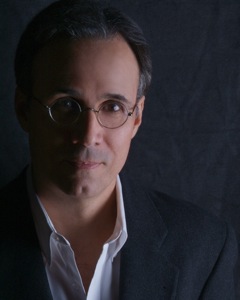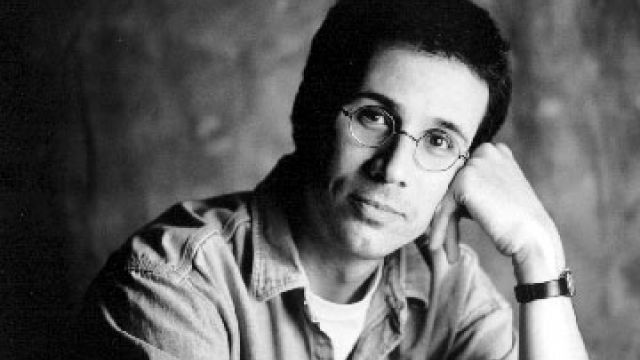John Bucchino in Australia
Popular American cabaret and musical theatre singer / songwriter John Bucchino is visiting Australia during March to accompany the Australian premiere of his musical revue, It’s Only Life, at Melbourne’s Chapel Off Chapel from March 10, and for a series of concerts beginning in Brisbane on March 2.
Stage Whispers: It’s Only Life is described as a musical revue of your songs – what is it that makes that collection of songs work together as a show?
John Bucchino: A revue is perhaps the trickiest form of show to put together. Since revues are usually made up of a string of disparate songs, the greatest mistake is to try to force those songs to tell a story they weren’t written to tell. If one does that, what may be perfectly good songs are diminished by their failure to function as theatre songs, propelling the story forward. So instead, one needs to find another way of tying the songs together into a cohesive whole. For It’s Only Life, Daisy Prince and I came up with a simple progression: moving from living from a place of fear to beginning to live one’s life from a place of love. The first words in the show are “I’m afraid...” and in the final song there is the line “Fear is what we learn / Love is who we are.”
SW: How did the show come about?
JB: When I moved to New York in 1992, I hadn’t yet written for theatre, but I had a huge backlog of “trunk songs,” individual songs that I wrote simply because I noticed something, or had an experience, or felt some deep emotion. As people here became acquainted with my work, quite a few tried to fashion some of those songs into a revue, but none were successful. Daisy and I are dear friends, and she’s a brilliant director who’s intimately acquainted with my work, so I asked her to help me put together a revue which became It’s Only Life.
SW: What were the influences and circumstances that led to you becoming a songwriter?
JB: I started playing piano by ear when I was a year old. And I just kept doing it because the piano was my favorite toy – it still is. In high school, many of the people I hung out with played guitar and learned pop songs off the radio. We had jam sessions, formed bands, and it was a natural next step in emulating our pop heroes (The Beatles, Stevie Wonder, Simon and Garfunkel, James Taylor, Carole King, etc.) to start writing ourselves. The music of that time not only shaped my writing style, but also greatly influenced my piano playing. I feel like my left hand is Paul (bass) and Ringo (percussion) and my right hand is John (melody) and George (rhythm guitar.) As I listened to more diverse types of music, classical, electronic, avant-garde, ethnic, jazz, it all fed into my writing and playing as well.
 SW: Do you see yourself more as a writer, composer or performer, or does the reality lie somewhere in between?Which is your major passion?
SW: Do you see yourself more as a writer, composer or performer, or does the reality lie somewhere in between?Which is your major passion?
JB: I love doing it all, and seem to focus on various aspects at different times. Sometimes I’m drawn to improvising on old standards at the piano, sometimes a new song will hit me out of nowhere and insist on being born, sometimes I’ll do a performance somewhere, even if just in somebody’s living room. The last few years have been more about writing, so I’m especially thrilled at the performing opportunities my trip to Australia will provide. And over the past 8 years or so, I’ve fallen in love with teaching – doing master classes where singers perform my songs for me and I offer suggestions, then usually accompany them myself. In fact, it may be that teaching has taken the forefront as my favorite creative thing to do.
SW: You’re probably best known as a writer of stand-alone cabaret songs, but you’ve also composed a Broadway musical – A Catered Affair. What influenced you and are you motivated to write other musicals?
JB: The A Catered Affair saga started when Harvey Fierstein, who I’d never met, sent me a fan letter. He’d just been given my Grateful CD by a mutual friend, and wrote to tell me how much he liked it. A couple of months later, he sent me another gushy letter, so I called him and asked if he’d like to have dinner. We got together and he asked if I’d be interested in writing the show with him and I said I didn’t think so – I’d never written a full-length book musical, and the prospect of working with a 4-time Tony winner not to mention a very strong personality was daunting. Plus, I didn’t know if a quiet little family drama would make a good musical. But, after a dinner with Harvey and my friend Stephen Schwartz where we discussed the show, Stephen told me he thought it would be a good thing for me to do, so I agreed to give it a try. I’m not especially personally motivated to write more theatre music.
SW: Tell us a little about your songwriting process – how does it vary between stand-alone songs and songs for book shows?What led to your step into musical theatre?
JB: I used to only write stand-alone songs. I wanted to be a singer/songwriter like Elton John or Billy Joel or Joni Mitchell, so I wrote what I thought were pop songs. I moved to Los Angeles to try to get a record deal, but my songs were too complicated and too different for any record companies to be interested. So I wrote and wrote, continuing to develop my own style, and continuing to bang my head against closed doors. In 1987 I got a phone call from Stephen Schwartz who’d heard some songs of mine at an East Coast benefit. He said he was coming to LA and wanted to meet me. I didn’t know his work, but knew he was a successful theatre writer, so I agreed to meet with him. He quickly became my best friend and a champion of my work who suggested I might want to think about writing for the theatre. Then I got a call from Stephen Sondheim who’d heard some songs of mine and wanted me to meet with him next time I was in New York. He also encouraged me to consider theatre writing. Eventually, since nothing was happening for me in L.A., I moved to New York where my songs found a growing audience – first in the cabaret community, and eventually in theatres. The main difference between writing a stand-alone song and one for a musical is that often a stand-alone or pop song relies on repetition to hook in the listener’s ear, whereas the theatre song, while it can have a “hook” in it, usually it must evolve, must continue to tell the story, pulling us forward instead of simply repeating a catchy chorus. For me, both types of songs involve writing from a clear perspective: with an individual song, that perspective is my own, and with a theatre song, the perspective is the character’s.
SW: Your songs have been performed by some great musical theatre and cabaret stars – have any of them been written with a particular performer in mind or have any of those stars commissioned you to write a particular song?
JB: When I’m writing by request, I ask for as much specific content as possible. Then I weave those details together to make the song as individually tailored as possible. I’ve only written three songs upon request from a singer. One was for a wonderful cabaret singer named Sally Mayes who wanted an opening number for her act, which she called The Story Hour. She told me what she wanted it to include, and I came up with a song called “Once Upon A Time” which she used to open both her show and the companion CD.
The second request came from my friend Billy Porter, an astonishing singer and writer, who was doing a Christmas show for which his mother was flying into town. He asked me to write a song he could sing to her and I wrote one called “A Mama Like Mine.”
The third song request came recently from an Australian performer named Tyran Parke, who’s putting together a show where the songs are each based on one of his brother’s extraordinary photographs. I will be including that song, “The Effect Of A Sky,” in the solo show I’m doing at Chapel Off Chapel on Mar. 14th.
 SW: You’ll be playing for the Melbourne production of your own show – what do you expect of the production and what do you expect to bring to the production?
SW: You’ll be playing for the Melbourne production of your own show – what do you expect of the production and what do you expect to bring to the production?
JB: Having seen and heard our actors via Skype, I expect funny, moving, beautifully sung performances. I expect to bring my perspective as the author, but also to discover things in the songs I didn’t know were there because of these uniquely talented people who will be interpreting them. And I expect to fall in love with Melbourne even more than I have on my past visits.
SW: What will the performers learn from you?
JB: They will learn where the songs came from and what my intention was when I wrote them. That might serve as a departure point for their discovery of what the songs each mean to them and how they can most fully inhabit and most affectingly share them.
SW: What is the most important thing that a performer can bring to your show?
JB: Heart and the craft to express that heart.
SW: Stella Entertainment & DTM’s Melbourne production of It’s Only Life will be an Australian Premiere. Has the show been performed anywhere else outside of the United States?
JB: No – this is the first performance outside of the U.S.
SW: Is it important to you that your show has broader exposure?
JB: Art is communication, so the more people to whom the show can communicate the better.
SW: Do you write for yourself or with the audience in mind?
JB: When a feeling or subject strikes me, I attempt to distill the essence of it into words and music. It’s like I see the end of a thread and follow it to wherever it leads, which often includes twists and turns even I don’t expect. So you could say I’m writing for me, but I guess I’m actually writing for the song itself, to honor it as best I can.
SW: While you’re here, not only are you going to accompany your own show, you will also perform your own concert. Tell us what we can expect?
JB: I’m always interested in hearing songwriters perform their own work. They have a take on it that, obviously, no one else has. While I’m by no means a great singer, what I lack in technique I hopefully make up for in commitment and unique insight. In my solo show I’ll sing and play songs that are not included in “It’s Only Life,” tell stories about the inspiration for the songs, about my life experiences, and some of the extraordinary talents with whom I’ve had the pleasure of working.
SW: You’ve been to Australia quite a number of times now. What attracts you? What else will you be doing while you are here?
JB: I’ve made some wonderful friends in Australia, and I feel my work is appreciated there – which is a huge draw for any artist! In addition to playing for “It’s Only Life,” and doing my solo show at Chapel Off Chapel, I’ll be doing concerts featuring terrific Australian singers in Brisbane (Mar. 2) and Sydney (Mar. 3) and master classes in those cities plus Melbourne, and a solo concert and master class in Hobart (Mar. 23.)
SW: What do you think of the standard of Australian performers?
JB: I hope this doesn’t sound like I’m sucking up, but honestly I think Australian performers on the whole are as good or better than performers with whom I’ve worked in the States.
SW: How difficult is it for Australian performers to obtain work in music theatre in the United States and should they try?
JB: Oh my, I don’t know how difficult it is. It’s certainly more difficult if they don’t have a work visa or green card because, naturally, it’s easier for casting directors to hire American actors. So I think an Australian would have to be truly exceptional. Case in point: my dear friend David Campbell, who first conquered the cabaret world here and then moved into theatre. In general, I believe people should try whatever they believe they can achieve.
SW: Mark Featherby, Stella’s principal, is investigating bringing out to Australia potential new musicals from the United States as part of their workshop development program. What is your view on that process and do you think that it could work?
JB: I think Mark’s goals are admirable, though it’s a tricky prospect to find new musicals that are well written. But Mark’s a smart fellow, and if anyone can find and develop worthy new works, both Australian and American, I bet he can.
SW: What are your plans for the future?
JB: I’ve been commissioned by a producer from Denmark to write songs for a new musical. It’s called Esaura, and we did a very successful reading of the first act over in Denmark this past summer. The script of Act 2 has just been completed, so when I get home from Australia I’ll be writing the songs for it. Then another reading over there this August and, hopefully, a full production in 2012. I hope to have more teaching opportunities, since I love doing that so much, and I’d like to do more solo piano recordings – a few years ago I did one called “On Richard Rodgers’ Piano” where I improvised on Rodgers tunes on the Steinway on which he wrote many of them. And I recently bought some new recording software with lots of great sounds, so I’m hoping to get back to writing more songs out of my personal experience and doing home recordings of them – which is what I dreamed of doing back in high school: simply writing and recording my songs and putting them out into the world. All this other stuff that’s happened has been a kind of surprising, delightful detour.
John Bucchino appeared in concert in Brisbane on March 2 (with Georgia Stitt), in Sydney on March 3, and Melbourne on March 14, 2011
Stella Entertainment & DTM’s Australian premiere season of It’s Only Life opened on March 10, 2011.
The top two images are of John Bucchino, while the lower image is of the Australasian premiere cast of It's Only Life during rehearsals.
To keep up with the latest news and reviews, like Stage Whispers on Facebook, or follow us on Twitter.
Subscribe to our E-Newsletter, buy our latest print edition or find a Performing Arts book at Book Nook.

